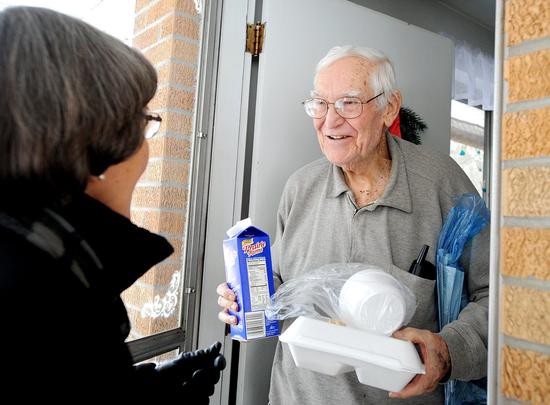“Thank you, is it okay if I give a little of the milk to the cat?”
by Howard Bedlin Vice President of Public Policy and Advocacy at NCOA
The American Rescue Plan includes important provisions that will help older adults get the supports they need at home and boost their financial security.
The $1.9 trillion relief package also includes health care improvements that will make it easier for adults aged 55 to 65 to afford care.
NCOA has championed many key provisions in the bill to increase funding, including for nutrition programs and community services.
The American Rescue Plan, signed into law by President Biden on March 11, includes critical relief to older adults in need as the nation continues to recover from the coronavirus pandemic. Nearly 30 million Americans have contracted COVID-19, with the death toll now surpassing 532,000. Eight in 10 deaths reported are adults aged 65+.
The $1.9 trillion relief package is a step forward in ensuring resources are targeted to the most vulnerable. The law is expected to contribute to greater economic stability—potentially reducing the adult poverty rate by more than a quarter and the child poverty rate by half. Below you’ll find a summary of the final package, including several of NCOA’s priorities.
More than 11 million older adults and their caregivers rely on Older Americans Act (OAA) programs to stay independent. These include senior centers, healthy aging programs, nutrition, in-home services, transportation, caregiver support, and elder abuse protections. The law earmarks $1.43 billion for OAA programs, including:
Nutrition services such as home-delivered meals ($750 million)
Supportive services, including COVID-19 vaccination outreach and efforts to address social isolation ($460 million)
The National Family Caregiver Support Program, which provides caregiver counseling, support groups, training, and respite care ($145 million)
Evidence-based health promotion and disease prevention programs, including for falls prevention and chronic diseases ($44 million)
Nutrition and supportive services for Native American communities ($25 million)
The Long-Term Care Ombudsman Program, which advocates on behalf of individuals living in nursing homes ($10 million)
Medicaid Home Care Services
The law invests $276 million per year in the Elder Justice Act over the next two years. This will support programs to combat elder abuse, promote elder justice research and innovation, enhance Adult Protective Services, and provide protections for residents of long-term care facilities.
Older adults are eligible for direct COVID relief under the act. Individuals earning $75,000 per year and couples earning $150,000 will receive the full $1,400 per person stimulus check. These amounts are gradually reduced and then phased out for individuals earning over $80,000 and couples earning over $160,000.
Roughly 5 million low-income adults aged 60+ rely on the Supplemental Nutrition Assistance Program (SNAP) to afford food. Many older adults need more than the average $121 per month SNAP benefit, especially as COVID restrictions make it harder to access food.

